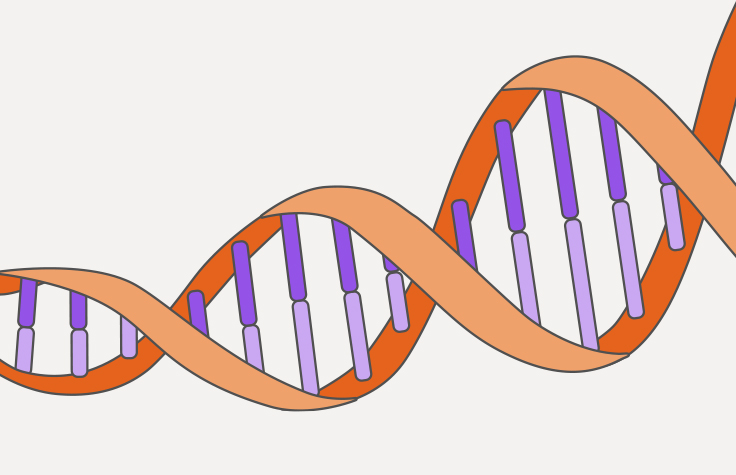Genomics
A comprehensive understanding of biology through genomics
Using NGS for genetic insights

What is genomics?
Genomics is the comprehensive study of the genome, which includes the complete set of genetic information in an organism. This area of study also examines the structure, function, changes in sequence, location of genes (gene mapping), and techniques used to study the genome.
Advances in genomic analysis technologies, such as next-generation sequencing, enable researchers to efficiently study how DNA plays a role in health and disease with unprecedented scale, speed, and accuracy.
Key techniques to explore the genome
Next-generation sequencing (NGS) technology is a powerful tool to study genomic sequences and allows insights into many biological questions. DNA sequencing and genotyping techniques can provide essential tools to better understand health and disease. Explore these essential genomic techniques below to learn more.
Whole-genome sequencing
Explore whole-genome sequencing using NGS for comprehensive genetic analysis.
Exome sequencing
Efficiently identify coding variants across a broad range of applications, including population genetics, genetic disease, and cancer studies.
Targeted sequencing
Save time, lower expenses, and efficiently analyze data with targeted sequencing.
Genotyping
Get an overview of genotyping techniques and see how to study genetic variants such as single nucleotide variants, copy number variants, and large structural changes in DNA.
How is genomics used in multiomics profiling?
Genomic sequence data can be combined with other omic information to help researchers identify candidate genes and understand mechanisms controlling interesting phenotypes. This holistic, multiomics approach can uncover new regulatory elements for biomarkers and therapeutic targets.
Targeted therapeutics
See how Dr. Victoria Parikh, Assistant Professor of Medicine at Stanford University uses genome sequencing and omics approaches to pave the way for precision cardiovascular medicine.
Cancer immunotherapy research advances
This webinar covers exciting advancements using a multiomic approach to develop targeted immunotherapies through the integration of genomic, transcriptomic, and proteomic data.
Exploring the genetic basis of oral cancer
Learn how genomic analysis is making headway with a a deadly oral cancer that is strongly associated with chewing tobacco together with slaked lime.
Genetic and complex disease research
A multiomics approach can uncover deeper biological context to disease-causing variants and accelerate our understanding of common disorders, unlock new pathways, biomarkers, and drug targets.
Streamline your genomics workflow
Prepare Libraries
DNA Library Preparation
Explore flexible and efficient DNA library prep for a broad range of applications. Illumina DNA PCR Free Prep and Illumina DNA Prep with Enrichment offer a high-performing, fast, and integrated workflow for sensitive applications.
Sequence
Production-Scale Sequencers
Access multiple omics on a single instrument. Deep and broad coverage through advanced applications for a comprehensive view of omic data with the NovaSeq X Series and NovaSeq 6000 Sequencing System.
Benchtop Sequencers
Flexible, affordable, and scalable to help both new and experienced users achieve fast turnaround times and reduced operating costs with NextSeq 1000 and NextSeq 2000 Sequencing Systems.
Analyze Data
Illumina Connected Analytics
A secure genomic data platform to operationalize informatics and drive scientific insights.
DRAGEN Analysis
Accurate, comprehensive, and efficient secondary analysis of next-generation sequencing data.
Correlation Engine
Correlation Engine is an interactive knowledge base where users can put their private multiomic data into biological context with highly curated public multiomic data.
Related applications
Human genotyping
Explore the benefits of human genotyping with arrays for trusted data quality, high throughput demands, and more.
Cancer germline mutation studies
Study the complete set of RNA transcripts produced by the genome.
Complex disease genomics
Find out more about disease association studies, gene target identification, polygenic risk scores, and other research topics.
Genome-wide association studies
Explore how to use high-throughput genomic technologies to quickly scan entire genomes of large numbers of subjects and find genetic variants correlated with a trait or disease.
Genetic and rare diseases
We're developing solutions to facilitate early detection and intervention for affected families.
Cardiovascular disease research
Cardiac gene panels using NGS can help to detect variants associated with cardiomyopathy and other heart diseases.
Additional Resources
Sequencing platforms brochure
Explore our full suite of systems to harness the power of next-generation sequencing to meet your ever-evolving needs.
Genomics research hub
Explore how we aggregate, analyze, and interpret genomic data for meaningful insights.
Polygenic risk scores could become useful tools in the physician's toolbox
Researchers perform genome-wide association studies to identify disease-associated DNA risk loci and develop PRSs for clinical validation.
Biomarker discovery in cancer research
Read how NGS-based solutions were used to search for gene expression profiles for cancer biomarker discovery.
Using genomics for tuberculosis surveillance
Read how Dr. Camilla Rodrigues is using NGS to fight MDR-TB at the P.D. Hinduja Hospital and Medical Research Centre in Mumbai, India.